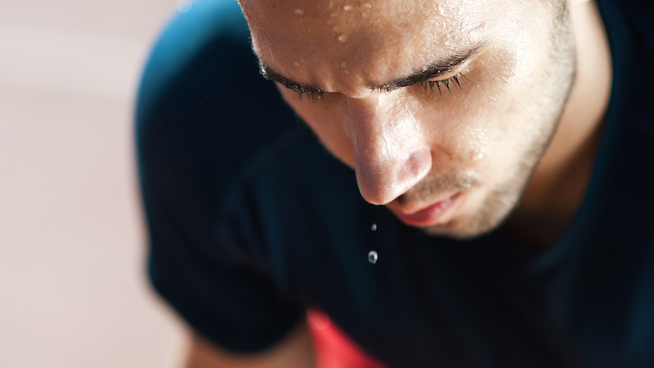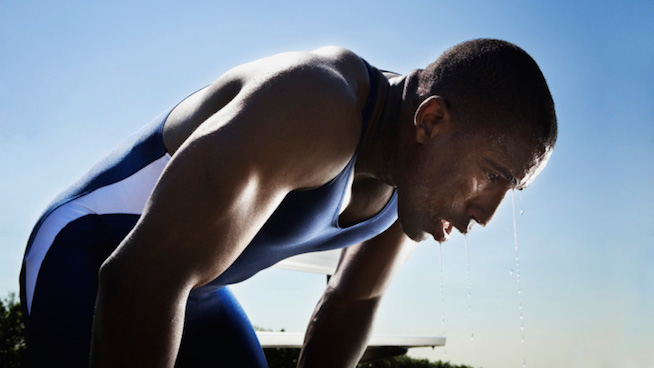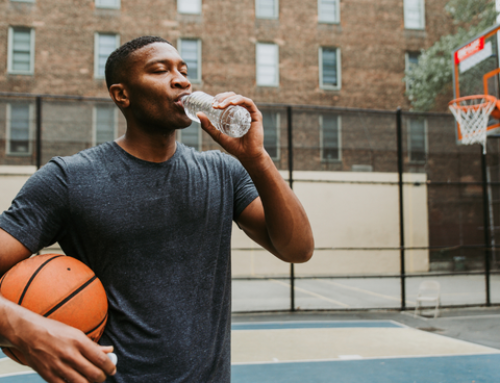Why Do I Sweat So Much?
“Why do I sweat so much?”
If you walk around the gym with a trail of sweat on the floor behind you, this question probably comes to mind. Sometimes it might feel like you are constantly soaked, even if you’re not doing an overly hard workout. Another person in the gym might be doing a similar workout, and he or she is dry as a bone.
What gives?
Several factors contribute to how much you sweat. But first, you need to understand why you sweat in the first place.
Why Do I Sweat?
Sweating is the body’s natural process to cool itself down. Sweat can be caused by an emotional response such as anxiety, an illness or physical exertion, which is what we focus on below.
When you exert yourself during exercise, your body’s core temperature begins to rise, and this is detected by temperature sensors throughout your body. Your central nervous system—specifically an area of your brain called the hypothalamus—processes this information and signals over two million sweat glands to release sweat.
Sweat is mostly water, but it also contains sodium and other minerals. As discussed in the video above, some people are saltier sweaters than others.
Sweat begins to evaporate when it reaches the surface of your skin, which exchanges heat from your skin for the cooler temperature of the air. The blood that runs under your skin is cooled and pumped to the core of your body, helping you maintain an ideal body temperature of 97.9 to 99.1 degrees Fahrenheit.
To further understand how the process works, think back to a time when you had a fever. During a fever, your body temperature spikes above normal levels. Once the fever breaks, your central nervous systems wants to return your body to its normal temperature as quickly as possible. The result is a period of profuse sweating.
The harder you work during exercise, the more you will sweat, giving your body a greater cooling effect. Sports equipment and some clothing make cooling difficult because of its insulating effect. When I play hockey, despite the cold environment, I sweat profusely, largely because of the gear I wear.
Humidity also plays a role in sweating. Humid air is saturated with water, making it harder for sweat to evaporate into the air. This causes the body to release more sweat. At a certain point, your body might not be able to cool itself, resulting in heat-related illness. The combination of heat and humidity explains why most heat-related illness occurs in southern climates.
RELATED: The Dangers of Heat Stress for Athletes
Why Do I Sweat More Than Other People?

Some people sweat more than others. It can be kind of annoying. To many people, sweat is a sign that they’re out of shape, but that is not always the case.
People who carry around extra weight most likely sweat more than others. They have to work harder to complete a task than those who don’t carry extra weight, causing their body temperature to rise more.
That said, plenty of elite athletes are heavy sweaters. As you improve your conditioning, your body becomes more efficient and is better able to regulate its body temperature. When you consistently train, you might notice that you begin sweating more quickly and intensely. This is not because you’re out of shape but because your body has become a more efficient at cooling itself down.
Also, regularly training in heat can cause athletes to sweat more. Regular workouts in hot environments train the body to cool itself better, and sweat glands are able to release more sweat. This follows a logic similar to strength training. If you put stress on your body by lifting weights or working out in heat, it will adapt and become more efficient to overcome that stress in the future. It’s pretty amazing.
Finally, there is the genetic factor. Some people are simply heavier sweaters than others. It’s hard to tell when athletes sweat a lot because of equipment, but one sport we can look at is tennis.
When Andy Roddick was on the ATP Tour, he sweat so much that a constant stream of drips fell off the brim of his hat. Yet Roger Federer hardly even breaks a sweat. Obviously, they are both in peak condition. Yes, some factors in Roddick’s game weren’t as fluid as Federer’s, but the two players were still largely doing the same thing. Roddick was simply a heavier sweater.
So what does your sweat level say about you? If you’re out of shape, heavy sweating confirms that fact. But if you’re in shape and yet your t-shirts are drenched after each workout, fear not. Your body is doing a great job of cooling itself off.
RELATED: How Sports Hydration Affects Your Performance
How Can I Sweat Less?

There’s not much you can do to sweat less during exercise. Of course, deodorant helps on a day-to-day basis, but it won’t do much when you’re moving through a tough workout.
The key to sweating less is simply to allow your body to sweat. Bare skin is the best way to do it, but that’s obviously not possible in many circumstances.
You do need to consider the clothing you wear. Lightweight athletic attire that allows your skin to breathe and doesn’t get saturated with sweat is your best option. A t-shirt might seem light, but the material can absorb sweat and act as a barrier to the evaporation process. Every layer of equipment you wear further impedes sweat, so consider this when you suit up for a workout or game.
Reference
Physiological Responses to Exercise in Heat; The Effects of Moisture-Wicking Fabric Shirts
RECOMMENDED FOR YOU
MOST POPULAR
Why Do I Sweat So Much?
“Why do I sweat so much?”
If you walk around the gym with a trail of sweat on the floor behind you, this question probably comes to mind. Sometimes it might feel like you are constantly soaked, even if you’re not doing an overly hard workout. Another person in the gym might be doing a similar workout, and he or she is dry as a bone.
What gives?
Several factors contribute to how much you sweat. But first, you need to understand why you sweat in the first place.
Why Do I Sweat?
Sweating is the body’s natural process to cool itself down. Sweat can be caused by an emotional response such as anxiety, an illness or physical exertion, which is what we focus on below.
When you exert yourself during exercise, your body’s core temperature begins to rise, and this is detected by temperature sensors throughout your body. Your central nervous system—specifically an area of your brain called the hypothalamus—processes this information and signals over two million sweat glands to release sweat.
Sweat is mostly water, but it also contains sodium and other minerals. As discussed in the video above, some people are saltier sweaters than others.
Sweat begins to evaporate when it reaches the surface of your skin, which exchanges heat from your skin for the cooler temperature of the air. The blood that runs under your skin is cooled and pumped to the core of your body, helping you maintain an ideal body temperature of 97.9 to 99.1 degrees Fahrenheit.
To further understand how the process works, think back to a time when you had a fever. During a fever, your body temperature spikes above normal levels. Once the fever breaks, your central nervous systems wants to return your body to its normal temperature as quickly as possible. The result is a period of profuse sweating.
The harder you work during exercise, the more you will sweat, giving your body a greater cooling effect. Sports equipment and some clothing make cooling difficult because of its insulating effect. When I play hockey, despite the cold environment, I sweat profusely, largely because of the gear I wear.
Humidity also plays a role in sweating. Humid air is saturated with water, making it harder for sweat to evaporate into the air. This causes the body to release more sweat. At a certain point, your body might not be able to cool itself, resulting in heat-related illness. The combination of heat and humidity explains why most heat-related illness occurs in southern climates.
RELATED: The Dangers of Heat Stress for Athletes
Why Do I Sweat More Than Other People?

Some people sweat more than others. It can be kind of annoying. To many people, sweat is a sign that they’re out of shape, but that is not always the case.
People who carry around extra weight most likely sweat more than others. They have to work harder to complete a task than those who don’t carry extra weight, causing their body temperature to rise more.
That said, plenty of elite athletes are heavy sweaters. As you improve your conditioning, your body becomes more efficient and is better able to regulate its body temperature. When you consistently train, you might notice that you begin sweating more quickly and intensely. This is not because you’re out of shape but because your body has become a more efficient at cooling itself down.
Also, regularly training in heat can cause athletes to sweat more. Regular workouts in hot environments train the body to cool itself better, and sweat glands are able to release more sweat. This follows a logic similar to strength training. If you put stress on your body by lifting weights or working out in heat, it will adapt and become more efficient to overcome that stress in the future. It’s pretty amazing.
Finally, there is the genetic factor. Some people are simply heavier sweaters than others. It’s hard to tell when athletes sweat a lot because of equipment, but one sport we can look at is tennis.
When Andy Roddick was on the ATP Tour, he sweat so much that a constant stream of drips fell off the brim of his hat. Yet Roger Federer hardly even breaks a sweat. Obviously, they are both in peak condition. Yes, some factors in Roddick’s game weren’t as fluid as Federer’s, but the two players were still largely doing the same thing. Roddick was simply a heavier sweater.
So what does your sweat level say about you? If you’re out of shape, heavy sweating confirms that fact. But if you’re in shape and yet your t-shirts are drenched after each workout, fear not. Your body is doing a great job of cooling itself off.
RELATED: How Sports Hydration Affects Your Performance
How Can I Sweat Less?

There’s not much you can do to sweat less during exercise. Of course, deodorant helps on a day-to-day basis, but it won’t do much when you’re moving through a tough workout.
The key to sweating less is simply to allow your body to sweat. Bare skin is the best way to do it, but that’s obviously not possible in many circumstances.
You do need to consider the clothing you wear. Lightweight athletic attire that allows your skin to breathe and doesn’t get saturated with sweat is your best option. A t-shirt might seem light, but the material can absorb sweat and act as a barrier to the evaporation process. Every layer of equipment you wear further impedes sweat, so consider this when you suit up for a workout or game.
Reference
Physiological Responses to Exercise in Heat; The Effects of Moisture-Wicking Fabric Shirts












